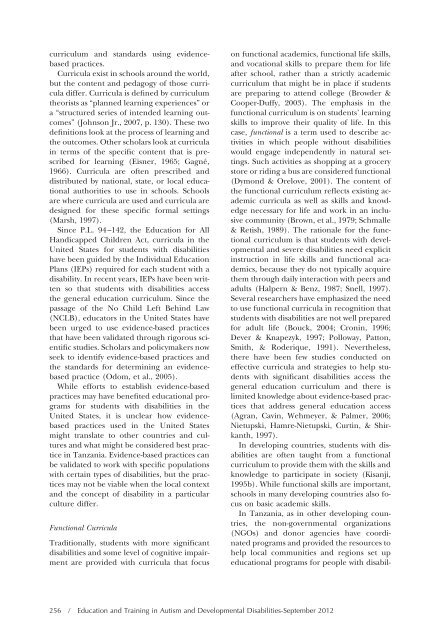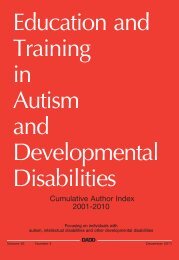etadd_47(3) - Division on Autism and Developmental Disabilities
etadd_47(3) - Division on Autism and Developmental Disabilities
etadd_47(3) - Division on Autism and Developmental Disabilities
Create successful ePaper yourself
Turn your PDF publications into a flip-book with our unique Google optimized e-Paper software.
curriculum <strong>and</strong> st<strong>and</strong>ards using evidencebased<br />
practices.<br />
Curricula exist in schools around the world,<br />
but the c<strong>on</strong>tent <strong>and</strong> pedagogy of those curricula<br />
differ. Curricula is defined by curriculum<br />
theorists as “planned learning experiences” or<br />
a “structured series of intended learning outcomes”<br />
(Johns<strong>on</strong> Jr., 2007, p. 130). These two<br />
definiti<strong>on</strong>s look at the process of learning <strong>and</strong><br />
the outcomes. Other scholars look at curricula<br />
in terms of the specific c<strong>on</strong>tent that is prescribed<br />
for learning (Eisner, 1965; Gagné,<br />
1966). Curricula are often prescribed <strong>and</strong><br />
distributed by nati<strong>on</strong>al, state, or local educati<strong>on</strong>al<br />
authorities to use in schools. Schools<br />
are where curricula are used <strong>and</strong> curricula are<br />
designed for these specific formal settings<br />
(Marsh, 1997).<br />
Since P.L. 94–142, the Educati<strong>on</strong> for All<br />
H<strong>and</strong>icapped Children Act, curricula in the<br />
United States for students with disabilities<br />
have been guided by the Individual Educati<strong>on</strong><br />
Plans (IEPs) required for each student with a<br />
disability. In recent years, IEPs have been written<br />
so that students with disabilities access<br />
the general educati<strong>on</strong> curriculum. Since the<br />
passage of the No Child Left Behind Law<br />
(NCLB), educators in the United States have<br />
been urged to use evidence-based practices<br />
that have been validated through rigorous scientific<br />
studies. Scholars <strong>and</strong> policymakers now<br />
seek to identify evidence-based practices <strong>and</strong><br />
the st<strong>and</strong>ards for determining an evidencebased<br />
practice (Odom, et al., 2005).<br />
While efforts to establish evidence-based<br />
practices may have benefited educati<strong>on</strong>al programs<br />
for students with disabilities in the<br />
United States, it is unclear how evidencebased<br />
practices used in the United States<br />
might translate to other countries <strong>and</strong> cultures<br />
<strong>and</strong> what might be c<strong>on</strong>sidered best practice<br />
in Tanzania. Evidence-based practices can<br />
be validated to work with specific populati<strong>on</strong>s<br />
with certain types of disabilities, but the practices<br />
may not be viable when the local c<strong>on</strong>text<br />
<strong>and</strong> the c<strong>on</strong>cept of disability in a particular<br />
culture differ.<br />
Functi<strong>on</strong>al Curricula<br />
Traditi<strong>on</strong>ally, students with more significant<br />
disabilities <strong>and</strong> some level of cognitive impairment<br />
are provided with curricula that focus<br />
<strong>on</strong> functi<strong>on</strong>al academics, functi<strong>on</strong>al life skills,<br />
<strong>and</strong> vocati<strong>on</strong>al skills to prepare them for life<br />
after school, rather than a strictly academic<br />
curriculum that might be in place if students<br />
are preparing to attend college (Browder &<br />
Cooper-Duffy, 2003). The emphasis in the<br />
functi<strong>on</strong>al curriculum is <strong>on</strong> students’ learning<br />
skills to improve their quality of life. In this<br />
case, functi<strong>on</strong>al is a term used to describe activities<br />
in which people without disabilities<br />
would engage independently in natural settings.<br />
Such activities as shopping at a grocery<br />
store or riding a bus are c<strong>on</strong>sidered functi<strong>on</strong>al<br />
(Dym<strong>on</strong>d & Orelove, 2001). The c<strong>on</strong>tent of<br />
the functi<strong>on</strong>al curriculum reflects existing academic<br />
curricula as well as skills <strong>and</strong> knowledge<br />
necessary for life <strong>and</strong> work in an inclusive<br />
community (Brown, et al., 1979; Schmalle<br />
& Retish, 1989). The rati<strong>on</strong>ale for the functi<strong>on</strong>al<br />
curriculum is that students with developmental<br />
<strong>and</strong> severe disabilities need explicit<br />
instructi<strong>on</strong> in life skills <strong>and</strong> functi<strong>on</strong>al academics,<br />
because they do not typically acquire<br />
them through daily interacti<strong>on</strong> with peers <strong>and</strong><br />
adults (Halpern & Benz, 1987; Snell, 1997).<br />
Several researchers have emphasized the need<br />
to use functi<strong>on</strong>al curricula in recogniti<strong>on</strong> that<br />
students with disabilities are not well prepared<br />
for adult life (Bouck, 2004; Cr<strong>on</strong>in, 1996;<br />
Dever & Knapezyk, 1997; Polloway, Patt<strong>on</strong>,<br />
Smith, & Roderique, 1991). Nevertheless,<br />
there have been few studies c<strong>on</strong>ducted <strong>on</strong><br />
effective curricula <strong>and</strong> strategies to help students<br />
with significant disabilities access the<br />
general educati<strong>on</strong> curriculum <strong>and</strong> there is<br />
limited knowledge about evidence-based practices<br />
that address general educati<strong>on</strong> access<br />
(Agran, Cavin, Wehmeyer, & Palmer, 2006;<br />
Nietupski, Hamre-Nietupski, Curtin, & Shirkanth,<br />
1997).<br />
In developing countries, students with disabilities<br />
are often taught from a functi<strong>on</strong>al<br />
curriculum to provide them with the skills <strong>and</strong><br />
knowledge to participate in society (Kisanji,<br />
1995b). While functi<strong>on</strong>al skills are important,<br />
schools in many developing countries also focus<br />
<strong>on</strong> basic academic skills.<br />
In Tanzania, as in other developing countries,<br />
the n<strong>on</strong>-governmental organizati<strong>on</strong>s<br />
(NGOs) <strong>and</strong> d<strong>on</strong>or agencies have coordinated<br />
programs <strong>and</strong> provided the resources to<br />
help local communities <strong>and</strong> regi<strong>on</strong>s set up<br />
educati<strong>on</strong>al programs for people with disabil-<br />
256 / Educati<strong>on</strong> <strong>and</strong> Training in <strong>Autism</strong> <strong>and</strong> <strong>Developmental</strong> <strong>Disabilities</strong>-September 2012

















